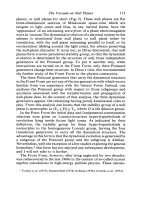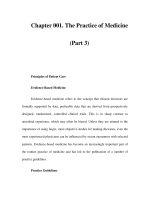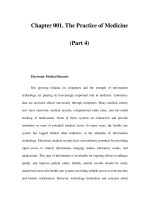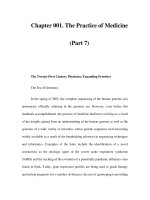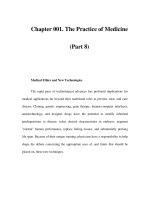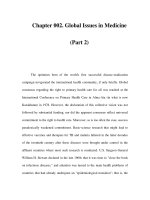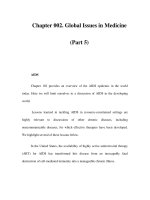Chapter 001. The Practice of Medicine (Part 8) pps
Bạn đang xem bản rút gọn của tài liệu. Xem và tải ngay bản đầy đủ của tài liệu tại đây (13.52 KB, 5 trang )
Chapter 001. The Practice of Medicine
(Part 8)
Medical Ethics and New Technologies
The rapid pace of technological advances has profound implications for
medical applications far beyond their traditional roles to prevent, treat, and cure
disease. Cloning, genetic engineering, gene therapy, human-
computer interfaces,
nanotechnology, and designer drugs have the potential to modify inherited
predispositions to disease, select desired characteristics in embryos, augment
"normal" human performance, replace fa
iling tissues, and substantially prolong
life span. Because of their unique training, physicians have a responsibility to help
shape the debate concerning the appropriate uses of, and limits that should be
placed on, these new techniques.
The Physician as Perpetual Student
It becomes all too apparent from the time we graduate from medical school
that as physicians our lot is that of the "perpetual student" and the mosaic of our
knowledge and experiences is eternally unfinished. This concept can be at the
same time exhilarating and anxiety-provoking.
It is exhilarating because we will continue to expand our knowledge that
can be applied to our patients; it is anxiety-
provoking because we realize that we
will never know as much as we want or need to know.
A
t best, we will translate this latter feeling into energy to continue to
improve ourselves and realize our potential as physicians. In this regard, it is the
responsibility of a physician to pursue new knowledge continually by reading,
attending conferences and courses, and consulting colleagues and the Internet.
This is often a difficult task for a busy practitioner; however, such a
commitment to continued learning is an integral part of being a physician and
must be given the highest priority.
Research, Teaching, and the Practice of Medicine
The title doctor is derived from the Latin docere
, "to teach," and physicians
should share information and medical knowledge with colleagues, with students of
medicine and related professions, and with their patients
. The practice of medicine
is dependent on the sum total of medical knowledge, which in turn is based on an
unending chain of scientific discovery, clinical observation, analysis, and
interpretation.
Advances in medicine depend on the acquisition of new i
nformation
through research, and improved medical care requires the transmission of this
information.
As part of broader societal responsibilities, the physician should encourage
patients to participate in ethical and properly approved clinical investigat
ions if
they do not impose undue hazard, discomfort, or inconvenience.
On the other hand, physicians engaged in clinical research must be alert to
potential conflicts of interest between their research goals and their obligations to
individual patients; the best interests of the patient must always take priority.
To wrest from nature the secrets which have perplexed philosophers in all
ages, to track to their sources the causes of disease, to correlate the vast stores of
knowledge, that they may be quickly
available for the prevention and cure of
disease—these are our ambitions.
–William Osler, 1849–1919
Further Readings
Blank L et al: Medical professionalism in the new millennium: A physician
charter 15 months later. Ann Intern Med 138:839, 2003 [PMID: 12755556]
Council on Graduate Medical Education:
Thirteenth Report: Physician
Education for a Changing Health Care Environment
. US Department of Health
and Human Services, March 1999
Guttmacher AE, Collins FS: Welcome to the genomic era.
N Engl J Med
349:996, 2003 [PMID: 12954750]
Ludmerer KM, Johns MME: Reforming graduate medical eduction. JAMA
294:1083, 2005 [PMID: 16145029]
Straus SE et al: Teaching evidence-
based medicine skills can change
practice in a community hospital. J Gen Intern Med 20:34
0, 2005 [PMID:
15857491]
